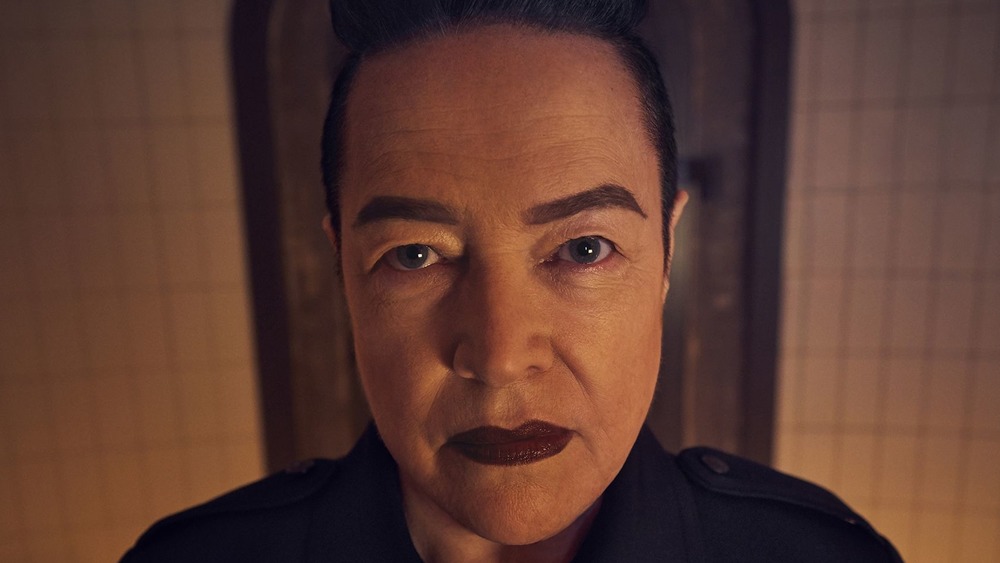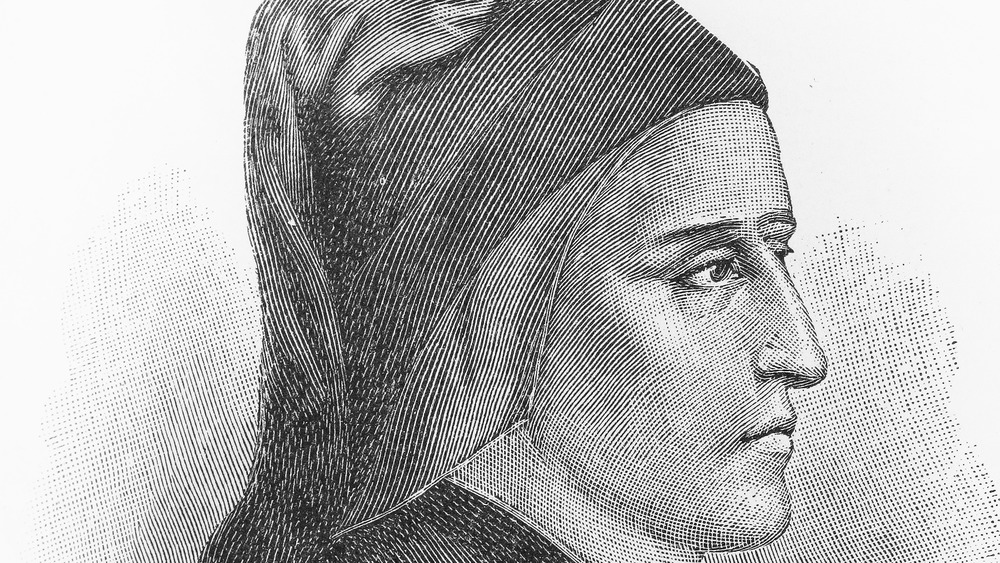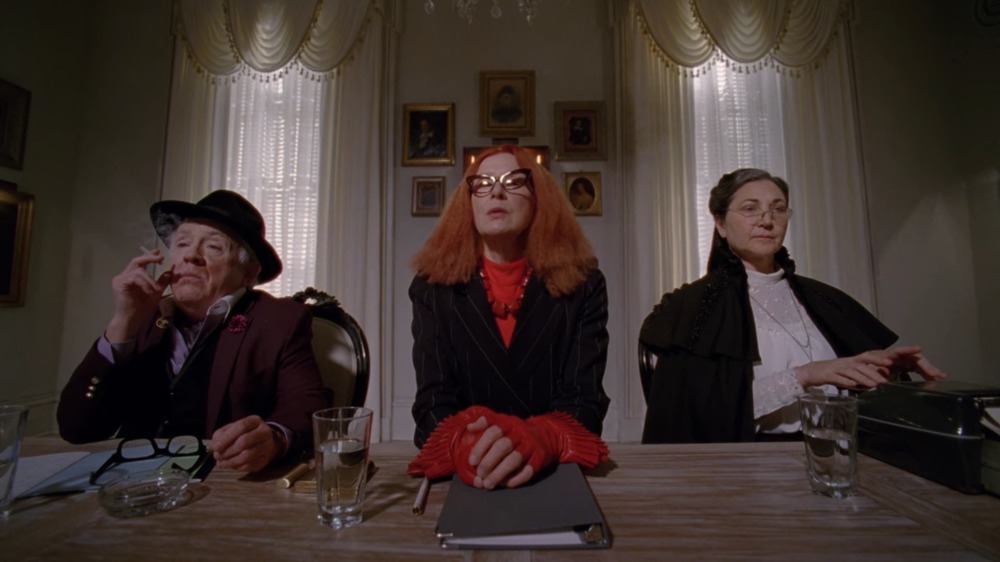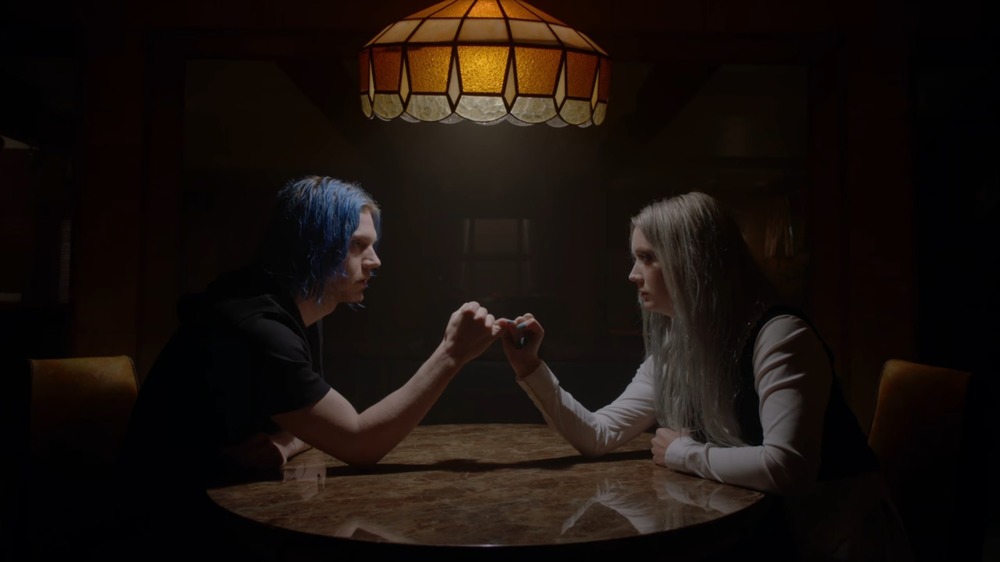The American Horror Story Theory That Has Fans Diving Into Classic Literature
For anyone who loves a TV show full of subtext and hidden connections, American Horror Story is a goldmine. Since its inception, the anthology horror series has provided season after season of interlocking stories, imagery rich in allusion, and references to real events and people that provide clues to the meaning behind the narrative. There's no shortage of threads to pull at in any given season.
Because of this, there are many fan theories about the show. Some point to the ways in which each of the seemingly disparate seasons often overlap, while others draw parallels to the similarities between the fictional world of American Horror Story and actual American horror stories. But there's one theory in particular that seeks to connect American Horror Story to one of the most formative pieces of Western literature in history.
The Divine Comedy, an epic poem written in the early 14th century by the Italian writer Dante Alighieri, gives a fictionalized account of the author's journey into Hell, then Purgatory, and then to Heaven. The first part, known as Inferno, depicts Dante's journey into nine distinct circles of Hell, each of which are synonymous with a particular type of sinful behavior. In order, they are Limbo, Lust, Gluttony, Greed, Wrath, Heresy, Violence, Fraud, and Treachery.
Some American Horror Story fans think that there may be a correlation between these nine circles and the nine seasons of the show.
Does each season of American Horror Story correlate to one of Dante's circles of Hell?
The theory that each season of American Horror Story thus far represents one of the nine circles of hell depicted in Dante's Inferno has been around for a lot longer than there have been nine seasons of the show. A quick search will reveal that fans have been discussing this theory on the series' Reddit board for years. The proponents of the theory got a major shot in the arm in 2017 when Ryan Murphy, who created the series along with Brad Falchuk, addressed it.
In a since-deleted Instagram post (via Inverse), Murphy put up what appeared to be his own take on the theory. Fans have long debated which season correlates with which circle of Hell, and Murphy apparently did assigning of his own. As far as Murphy saw it in 2017, those correlations were: Murder House (season 1) represents Limbo, Hotel (season 5) represents Gluttony, Freak Show (season 4) represents Greed, Roanoke (season 6) represents Anger, Cult (season 7) represents Heresy, Asylum (season 2) represents Fraud, and Coven (season 3) represents Treachery. The post was made before the existence of Apocalypse (season 8) or 1984 (season 9), but it's not hard to see them lining up with the other two circles, Violence and Lust, respectively.
Some fans remain unconvinced of the connection
However, just because the theory seems to have gotten a stamp of approval from Murphy himself doesn't mean everyone is buying it. As with all ambitious fan theories tying a decade's worth of TV seasons to specific elements of a famous work of literature, the Divine Comedy/American Horror Story hypothesis has more than a few holes in it.
First is the fact that while Murphy himself reportedly found connections between the circles of Hell and the various seasons, there's still a lot that doesn't match up. You may have clocked that in Murphy's list of connections, everything is out of order. One would think that if there was an intention to make correlations between the two, season 1 of the show would match with the first circle of Hell, and so on.
Fans have offered their own interpretation of the correlations that do line up. For instance, Reddit user u/Supreme000 made the case that if you reverse-match the seasons and circles of Hell, you find correlations. Murder House would then represent Treachery, Asylum would represent Fraud, Coven would represent Violence, and so on.
There are compelling arguments to be made for each, but at the end of the day, it's not actually hard to find elements from any given season of American Horror Story that might match up with the concept of Treachery or Violence. As Reddit user u/Yesveronica noted in a separate thread on the subject, "Ryan Murphy humored the concept in an Instagram post but...each season incorporates a plethora of different sins and nobody can seem to agree on a main sin for each season...It would have been a cool concept had they planned it from the get go, but they didn't."
There are other connections to draw between the Divine Comedy and American Horror Story
Even still, there are other ways that you can see links between Dante's work and American Horror Story. Inferno and the other sections of The Divine Comedy are an allegorical text about certain aspects of Christianity, but they also contain lots of commentary about culture and politics contemporary to Dante's day. There are many characters through all three sections who are either drawn from history, such as the ancient Roman poet Virgil, or who represent someone who lived in Dante's time. In casting these real-life figures in his fantastical story, Dante was providing readers with his own thoughts and opinions on them (via Ancient History Encyclopedia).
One could make the case that American Horror Story does a similar thing. The show frequently features characters, plot lines, and imagery that are either directly related to things in the real world or are meant to evoke them. Take, for instance, the Cult season, which features characters that serve as commentary on contemporary political issues like American news media, social justice movements, and the rise of Trumpism. Also consider how Stevie Nicks appears as herself as a witch in Coven. The show may not be using the structure of Dante's writing, but one could argue that there's still a line of inspiration between the two works.
And who knows? Maybe the upcoming tenth season of American Horror Story will see its characters heading to Purgatory.



